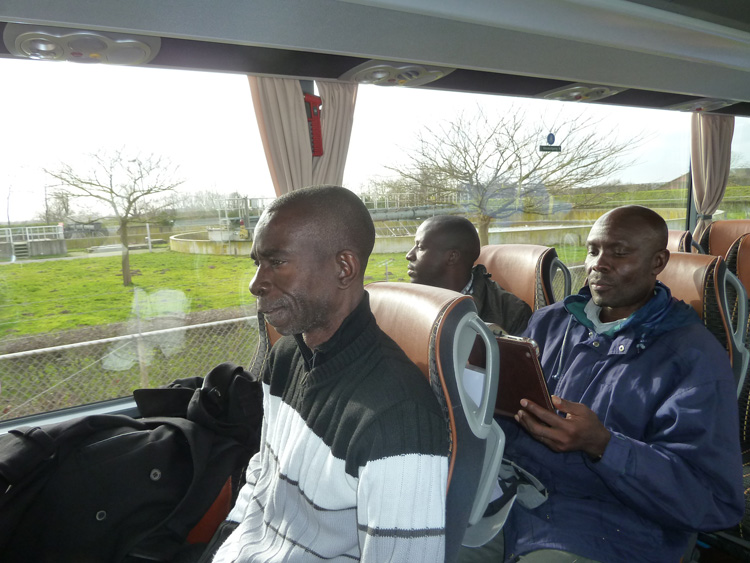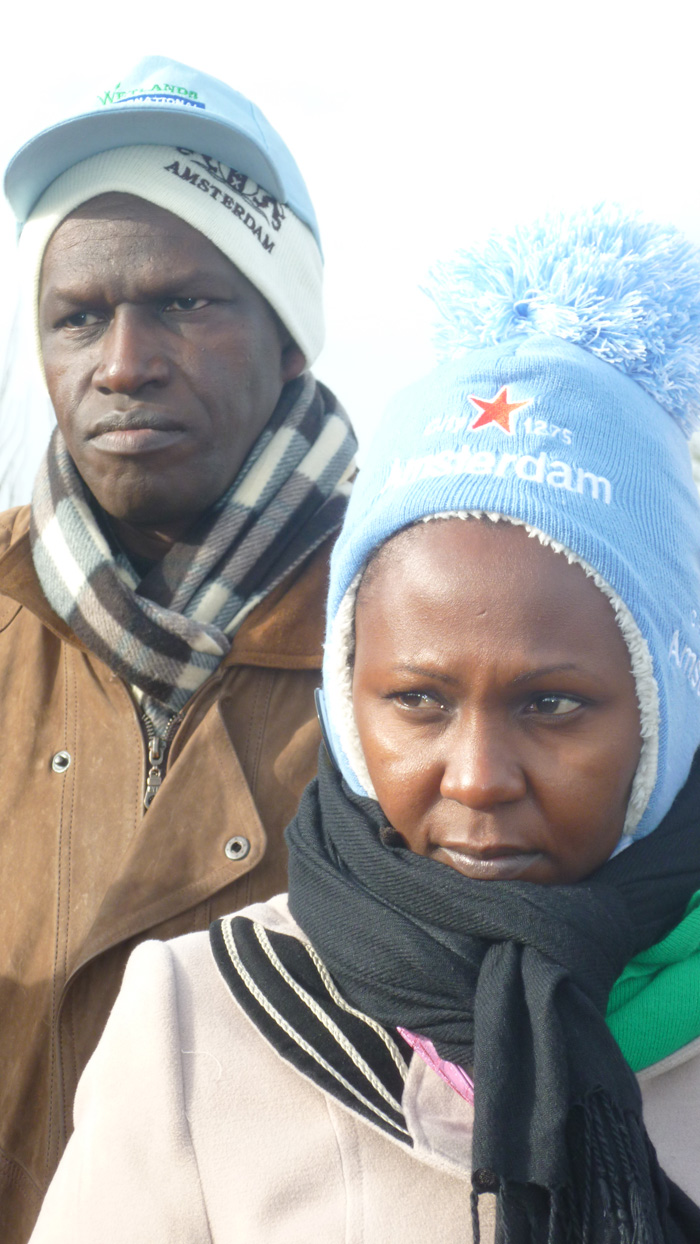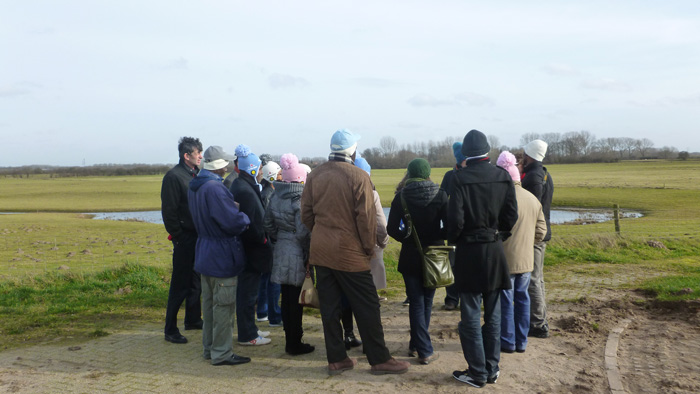Africa on the Dutch IJssel River
“I will not go!” Sena Alouka yells in the bus along the highway as we pass a desolate farm that is totally surrounded by bulldozers and soil that has been turned and ploughed. A familiar sight for most of the riders in the bus, which includes nine Africans, an Indonesian and a handful of Dutch people. Evictions and land expropriations are an almost daily occurrence in Africa and Indonesia. And then the whole group spontaneously chants: “I will not go! We will support you!”
Room for the River
It is 6 February and we are on our way to Voorst where we are going to take a look at the “Room for the River” project near the IJssel River. Sena Alouka, director of the environmental organisation JVE Togo, like the rest of the group, works on sustainable water management and the fair distribution of water in his own country. The group’s members work together with communities that all have vivid experiences of losing their livelihood when they’re suddenly faced with the fact that there are no more fish left in the river; or when the river just totally vanishes, leaving nothing to fish in; or when they discover their land and homes under water. Flooding sometimes also occurs in the Netherlands and so we are also going to see how this issue is tackled here.

Mame Latyr Fall (Forum Civil Senegal) , Dickens Kamugisha (AFIEGO Uganda), Robert Kugonza (NAPE Uganda)
Contributing to the thinking process
The involved partners all know from years of experience how difficult it is to manage water supplies and rivers in a sustainable manner and how important it is to get all of various water users (those from the neighbourhood, farmers, businesses) involved. Plans drawn up and subsequently adopted by the authorities without local consultation are pretty much doomed to fail. It is only when ideas involve the input of everyone involved and their ideas are taken seriously that one and all will sufficiently feel responsible for the success of a particular project. The magic words in this case are “participatory water management”. But our partners want to take this further: not only do the participants involved have to approve the plans but they also need to work together during the development phases.
Top-Sector Water
This method, which is called the “Negotiated Approach”, has already produced some positive results in various river basin areas around the world. Both ENDS, together with the above-mentioned African and Indonesian partner organisations, have been very active in introducing this method into practice in the regions these organisations focus on. This, however, will only succeed if local and national governments support it, and the Netherlands can potentially play an important role in this regard. The Netherlands has designated water as one of its top sectors for serious involvement. We Dutch people know better than anyone about the need to harness water and this knowledge is something we are more than willing to export.
|
|
 |
|
||
| Sena Alouka (JVE Togo) | Serah Munguti (Nature Kenya) and Papa Wawade Wade (Wetlands International Senegal) | Robert Kugonza (NAPE Uganda) |
However, we should not limit it to our technical knowledge; we should also be willing to export our water management “software”, which includes our experience with the consulting and negotiation processes, as well as our “polder model”. When it comes to water management, “software” is just as important as “hardware”. This became very clear during a recent luncheon reading organised by Both Ends on 5 February 2014 at the Ministry of Foreign Affairs, where two of our partners gave a presentation. By discussing their practical experiences in both Kenya and Togo, they were able to present a very powerful message.
Back to Voorst
Once we had arrived at the Water Board in Voorst we quickly saw with our own eyes the problematic nature of water along the IJssel. It is also became instantly clear how totally different the Dutch and African realities actually are. “How many homes end up under water here?” Serah Munguti of the Nature Kenya organisation asks the spokesperson giving us the tour of the project.
“For this particular part of the project we will need to evacuate about eight families.” Our guests stare at him in amazement. In other words, all this effort for just eight families? In Africa or Asia, a similar situation quickly means hundreds of victims. Moreover, the devastation these people experience largely goes uncompensated or under-compensated at best.
“And how much compensation do these families receive?” Munguti inquires.
“Enough to purchase a new farm, move all their belongings and start from scratch again.”

Prigi Arisandi (Ecoton Indonesia)
Prigi Arisandi, from Ecoton, an Indonesian organisation, is also very impressed. “We are already happy when the local government, after years of resistance and protest, finally relents and accepts responsibility for the quality of the water in our river. The issue of preventing flooding in Indonesia in the future has thus far remained unaddressed.”

Readiness does not cost anything
It is obvious that the Dutch model can never be transferred directly on a one-to-one basis in Africa, Asia or Latin America. In the Netherlands, they make plans for the very long term and plans are only developed after extensive studies have been performed. Meanwhile, non-Western countries tend to more readily operate in an ad hoc manner. That is not something one can change in a day. But negotiating, listening to people with practical experience, understanding one another’s point of view, considering the various interests and collectively arriving at a compromise, are certainly details that fit into many other realities than just our Dutch context. This means, first and foremost, that consciousness-raising, support and preparation are of particular importance. This is something our guests hope to take back with them from the Netherlands.
More information:
Cases and experiences of our African partners
Video about the Negotiated Approach in India and Africa
Read more about this subject
-
 News / 2 February 2026
News / 2 February 2026Seven years after Brumadinho: impunity allows Vale’s disasters to continue
Seven years ago, the dam owned by mining company Vale collapsed in Brumadinho, Brazil, killing 272 people and severely polluting the surrounding area. While the relatives of the victims commemorate them and fight for justice, the pollution continues.
-
 Event / 26 January 2026
Event / 26 January 2026Civic space at the frontlines
Environmental Defenders and the Role of International Trade and Investment Policy
Both ENDS invites you to an interactive dialogue with experts from the UN, policy, academia, and civil society on environmental defenders and international trade. Together, we will explore how citizens, policymakers, academics, and activists can defend civic space and support those on the frontlines of environmental and human rights struggles. With a focus on the Netherlands’ role in international trade and investment policy, and drawing on the experiences of activists from the Philippines, the event aims to foster solidarity and identify strategic priorities to better protect environmental defenders amid the global crackdown on civic space
-
 News / 22 January 2026
News / 22 January 2026Shell files new arbitration against the Netherlands over Groningen gas field closure
Shell is suing the Netherlands in yet another attempt to evade its responsibility for decades of gas extraction in Groningen. For years, gas production has triggered earthquakes, damaged over a hundred thousand homes, and left residents living in prolonged insecurity, still waiting for repairs, reinforcement, and justice.
-
 Dossier /
Dossier /Agua Zarca: indigenous fight against dam costs lives
Indigenous Hondurans are resisting the construction of the Agua Zarca hydrodam. Their fight has cost several lives, including that of Berta Cáceres. After considerable public pressure, Dutch development bank FMO withdrew from the project.
-
 Press release / 13 January 2026
Press release / 13 January 2026Investigation: FMO failed to exercise adequate control over project linked to the murder of Berta Cáceres
TEGUCIGALPA/UTRECHT, January 12, 2026 – The murder of indigenous environmental activist Berta Cáceres, which took place almost 10 years ago in Honduras, appears to be the result of an organized criminal operation, in which funds from the Dutch Development Bank FMO were misappropriated to finance illegal activities. This is the conclusion of the investigation report published today by the independent commission set up by the Inter-American Commission on Human Rights, the Honduran state, and the relatives of Berta Cáceres.
For years, FMO was a major financier of the Agua Zarca project. Berta Cáceres, an indigenous leader, fought against this controversial dam and was murdered for that reason in March 2016.
-
 Dossier /
Dossier /Gas in Mozambique
In 2011 one of the world’s largest gas reserves was found in the coastal province of Cabo Delgado, in the north of Mozambique. A total of 35 billion dollars has been invested to extract the gas. Dozens of multinationals and financiers are involved in these rapid developments. It is very difficult for the people living in Cabo Delgado to exert influence on the plans and activities, while they experience the negative consequences. With the arrival of these companies, they are losing their land.
-
 Blog / 11 December 2025
Blog / 11 December 2025Reflections on working on Dutch finance for Mozambique LNG
Last Tuesday, I received a short text message with big news: the minister had just announced that the financing policy for the Mozambique LNG project was stopped. It was a decision that I – along with so many others – have fought for for years. Only now, more than a week later, it is slowly sinking in that we have really won. The years of perseverance, frustration, discussions and investigations have finally led to this result. It still feels a bit surreal.
-
 Dossier /
Dossier /Export Credit Agencies: Who pays the price?
Both ENDS calls on the government only to provide export credit insurance to sustainable projects that cause no social and/or environmental damage in the countries where they take place.
-
 Press release / 2 December 2025
Press release / 2 December 2025End of Dutch involvement in controversial gas project in Mozambique in sight after TotalEnergies withdraws from Dutch insurance
THE HAGUE/CABO DELGADO, December 1, 2025 - Today, Minister of Finance Eelco Heinen announced that TotalEnergies is withdrawing from a $640 million Dutch export credit insurance policy for a controversial gas project in Mozambique. Although the Dutch government has been avoiding this decision for years, this move has finally ended part of the Dutch involvement in this disastrous project.
-
 Dossier /
Dossier /Indigenous communities threatened by Barro Blanco dam in Panama
The Barro Blanco dam project in Panama, which has Dutch financial support, is causing indigenous lands to disappear under water. Both ENDS is working to protect the rights of indigenous communities living near the dam.
-
 Blog / 1 December 2025
Blog / 1 December 2025The Long Road to Justice for the Ngäbe of Kiad
In October 2025 I travelled to Kiad, the Indigenous Ngäbe community that led the struggle against the FMO-financed Barro Blanco dam, for one last time. I went there to say my goodbyes, both personally and on behalf of Both ENDS, and to catch a first glimpse on how a community program financed by FMO and DEG – the result of a dialogue process that took several years – is giving a new impulse to the dam-affected communities. But how did we get here?
-
Publication / 27 November 2025
-
 Environmentally Just Practice /
Environmentally Just Practice /A Negotiated Approach for Inclusive Water Governance
A Negotiated Approach envisages the meaningful and long-term participation of communities in all aspects of managing the water and other natural resources on which their lives depend. It seeks to achieve healthy ecosystems and equitable sharing of benefits among all stakeholders within a river basin. This inclusive way of working is an essential precondition for the Transformative Practices that are promoted by Both ENDS and partners.
-
 News / 27 November 2025
News / 27 November 2025Communities and International Consortium Present Community-Led Plan for Nature-Based Adaptation to Sea-Level Rise in Coastal Bangladesh
Local communities in the southwestern coastal region of Bangladesh—together with an international consortium including Uttaran, CEGIS, and Both ENDS—have presented a community-led plan to confront climate change and accelerating sea-level rise through nature-based adaptation. The People’s Plan for Upscaling Ecosystem-Based Adaptation outlines a scalable strategy rooted in local ownership and generations of lived experience. At its centre is Community-Based Tidal River Management (CBTRM), a proven approach that reduces waterlogging, raises land elevation, and restores ecological balance by working with natural tidal and sediment dynamics.
-
 Dossier /
Dossier /Rights for People, Rules for Corporations – Stop ISDS!
Indigenous communities in Paraguay saw their attempts to regain their ancestral lands thwarted by German investors. In Indonesia, US-based mining companies succeeded to roll back new laws that were meant to boost the country’s economic development and protect its forests. This is the level of impact that investment treaties can have on social, environmental and economic development and rights. Why? Because of the ‘Investor-to-State Dispute Settlement’ clauses that are included in many such treaties.
-
 Blog / 25 November 2025
Blog / 25 November 2025COP30 shows why dismantling ISDS is essential for real climate action
Standing in Belém during COP30, I felt the weight of the moment. We came to the Amazon hoping for decisive progress on phasing out fossil fuels, yet the final outcome fell far short of the ambition science and justice demand. The agreement brought welcome commitments on adaptation finance and global indicators, but it refused to confront the structural forces that make climate action so difficult.
-
 Dossier /
Dossier /Wetlands without Borders
With our Wetlands without Borders program, we work towards environmentally sustainable and socially responsible governance of the wetlands system of the La Plata Basin in South America.
-
Publication / 17 November 2025
-
 Environmentally Just Practice /
Environmentally Just Practice /Non-Timber Forest Products (NTFPs)
About one in every six people, particularly women, directly rely on forests for their lives and livelihoods, especially for food. This shows how important non-timber forest products (NTFPs) and forests are to ensure community resilience. Not only as a source of food, water and income, but also because of their cultural and spiritual meaning.
-
Letter / 14 November 2025
Letter: TPAC’s report “Final Judgement Detailed Research MTCS’’
A coalition of Malaysian and international NGOs has released a memorandum in response to the recent TPAC report on the Malaysian Timber Certification Scheme (MTCS). The organisations express serious concerns about the independence, quality, and credibility of the assessment carried out by the Timber Procurement Assessment Committee (TPAC).









